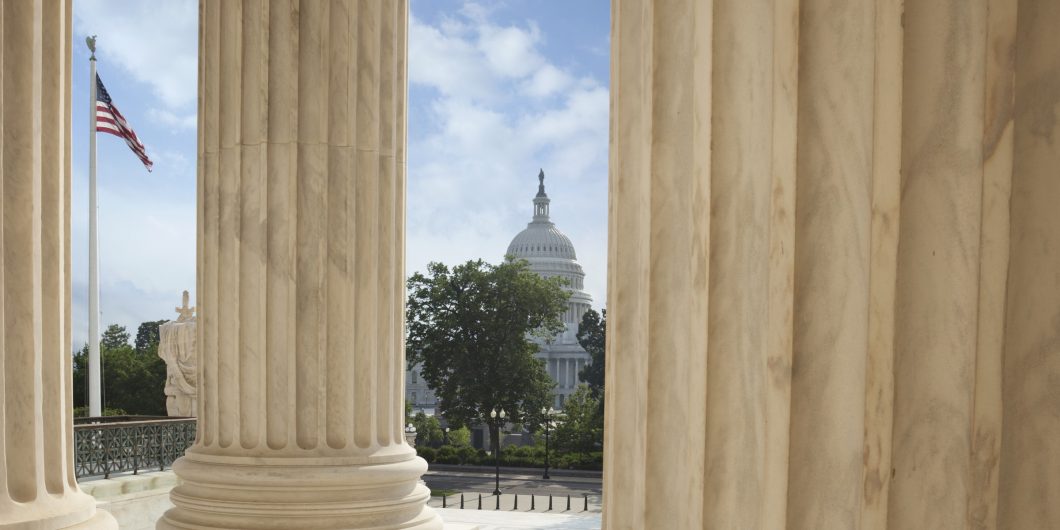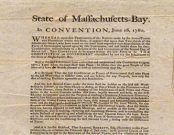A Nondelegation Doctrine the Court Can Believe In
After several generations in which the nondelegation doctrine has been largely ignored, the Supreme Court has given hints that it may start to enforce the doctrine once again. This change in constitutional interpretation could have enormous consequences, because a strong nondelegation doctrine poses a significant check on the excesses of the administrative state. But enforcing the nondelegation doctrine raises a problem that has made even those sympathetic to the doctrine hesitant about applying it—the view that there is no clear way to distinguish between constitutional and unconstitutional delegations of policymaking authority to the executive. Here, I want to propose a solution to that problem (elaborated in this article) that would allow for a judicially manageable nondelegation doctrine.
The nondelegation doctrine holds that Congress cannot delegate its legislative power to the executive branch. The legislative power is normally identified with policymaking discretion. Thus, the doctrine limits Congress from assigning policymaking to administrative agencies.
It was 85 years ago that the Supreme Court used the doctrine to strike down important delegations of legislative power in a few cases during the New Deal. But the doctrine fell prey to the New Deal judicial revolution. With the appointment of New Deal justices, the Supreme Court started to apply the doctrine extremely leniently to allow enormous delegations of policymaking discretion to the executive. Since the New Deal, no delegations reviewed by the Court—and there have been many—have been struck down as unconstitutional.
This relaxation of the doctrine has been important, since it has allowed the administrative state to grow. If a strict nondelegation doctrine were enforced, Congress would have to pass laws rather than simply having agencies enact rules, as is now the standard practice. This requirement would be significant because divided government (which usually exists) means that fewer and more moderate regulations would be passed if Congress had to enact them.
But the Supreme Court has now indicated that it may be willing to reinvigorate the nondelegation doctrine. In the 2019 case of Gundy v. United States, Justice Gorsuch wrote a dissent, joined by two other justices (Roberts and Thomas), advocating a return to a strict nondelegation doctrine. In a separate opinion, Justice Alito stated that he would be willing to revisit the doctrine in a suitable case, and in a subsequent opinion, Justice Kavanaugh expressed similar sentiments. That’s five justices, and with the addition of originalist Justice Amy Coney Barrett, there is a real chance of establishing a strong nondelegation doctrine.
There is a problem with a strict nondelegation doctrine, though: How does one distinguish between constitutional and unconstitutional delegations? This obstacle irked Justice Scalia and led him to refuse to enforce a strong nondelegation doctrine. In Mistretta v. United States, Scalia wrote:
Once it is conceded, as it must be, that no statute can be entirely precise, and that some judgments, even some judgments involving policy considerations, must be left to the officers executing the law and to the judges applying it, the debate over unconstitutional delegation becomes a debate not over a point of principle, but over a question of degree (emphasis added).
As a result, Scalia believed that courts should not enforce the nondelegation doctrine, even though he acknowledged the prohibition of delegation was part of the Constitution.
While Scalia was unwilling to have the courts enforce the doctrine, advocates of a strict judicially enforced nondelegation doctrine have also admitted that it would be difficult to draw the line between constitutional and unconstitutional delegations of policymaking discretion. Relying on some language from Chief Justice Marshall, Gary Lawson (who clerked for Scalia) argues that the Constitution requires Congress to decide the “important subjects,” but can allow the executive to resolve “matters of less interest.” This rule, which Lawson admits would involve very unclear applications, is precisely what Scalia feared.
Modern statutes often ask agencies to go beyond traditional legal interpretation and instead exercise policymaking discretion.
But after struggling with the issue for many years, I have discovered a more determinate way of drawing the distinction between constitutional and unconstitutional delegations of policymaking authority. In my view, the Constitution categorically prohibits the delegation of policymaking authority (in the area covered by the nondelegation doctrine, which I discuss in my penultimate paragraph). By contrast, Congress can assign non-policymaking tasks to the executive—most importantly, genuine legal interpretation and genuine fact-finding. If an agency is merely interpreting laws or finding facts, then it is not exercising policymaking authority and therefore its authority and actions are constitutional.
How do we determine whether an agency action constitutes legal interpretation? The answer is that, when interpreting a law, the agency must be acting as a traditional court would have done at the time of the Constitution’s ratification. It must seek to discern the meaning of the law from its text and intent. So long as the agency is behaving in this manner, its actions constitute legal interpretation rather than policymaking.
But modern statutes often ask agencies to go beyond such traditional legal interpretation. For example, imagine that a statute authorized an agency to adopt regulations that were in the public interest. If the agency then adopted a regulation on the ground that it was one of many possible regulations that were in the public interest, that would go beyond legal interpretation because the agency would be exercising policymaking discretion by deciding which public interest regulation to adopt. If the agency argued instead that the single regulation it adopted was uniquely determined by the public interest standard, this too would be unconstitutional because a court at the time of the Constitution would not interpret a general and vague term like “the public interest” to yield a single, specific regulation.
A similar approach distinguishes policymaking from fact-finding. If an agency is genuinely deciding a factual issue, then the agency is not exercising policymaking authority. But these days, agencies are often given discretion to decide issues that resemble fact questions, but which are actually decided on policy grounds. For example, agencies are sometimes asked to decide the fact question of whether a substance is a carcinogen, even though there is no good evidence one way or the other. Agencies often decide these questions by adopting a policy position, such as “it is better to be safe than sorry.” These types of decisions are not limited to factual findings but also include policy determinations, and therefore are unconstitutional. But if an agency is deciding only a genuine factual question—a question about which there is a knowable fact of the matter—then the decision will be constitutional.
Unlike the nondelegation doctrine that Scalia envisioned, my approach does not involve a question of degree. Instead, it involves the classification of a task as fact-finding, interpretive, or policymaking. There may be close cases—where it is not clear whether there is a genuine question of fact or law—but that is true in most areas of law. Significantly, there is a distinction in kind between questions of policy and questions of fact and law.
While my approach provides a relatively clear line between policymaking and executive authority, it does require courts to answer another question. In my view, the strict nondelegation doctrine only applies to actions that involve the regulation of private rights, such as common law rights. When the government regulates a private right, such as how one uses one’s land or operates one’s business, the strict nondelegation doctrine applies to this regulation. These were the rights at the Founding that were the most prized and considered most in need of protection. By contrast, a variety of laws, such as those involving spending programs, foreign affairs, and territories, are not covered by the strict nondelegation doctrine. There is significant historical evidence that delegations of these types occurred near the time of the Founding. While my approach thus requires courts to draw a distinction between laws that are and are not covered by the strict nondelegation doctrine, this task is no more difficult than many tasks undertaken by courts deciding constitutional issues.
In the end, the Constitution’s original meaning provides a judicially manageable line between constitutional and unconstitutional delegations of authority to the executive. Although there are other challenges to a strong nondelegation doctrine, such as the potentially disruptive effect it would have on our existing laws, a judicially manageable standard is not one of them.



